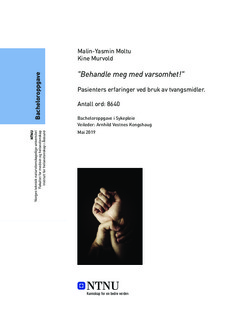| dc.contributor.advisor | Kongshaug, Arnhild Vestnes | |
| dc.contributor.advisor | Hunstad, Ingunn Klauset | |
| dc.contributor.author | Moltu, Malin-Yasmin | |
| dc.contributor.author | Murvold, Kine | |
| dc.date.accessioned | 2019-09-06T14:10:33Z | |
| dc.date.available | 2019-09-06T14:10:33Z | |
| dc.date.issued | 2019 | |
| dc.identifier.uri | http://hdl.handle.net/11250/2613493 | |
| dc.description.abstract | Hensikt: Hensikten med oppgaven er å undersøke pasienters erfaringer ved bruk av ulike tvangsmidler, og på denne måten skape en større forståelse hos helsepersonell.
Bakgrunn: Rapporter publisert av Helsedirektoratet viser økning i bruk av tvangsmidler, samt at 2200 pasienter hadde vedtak om bruk av tvangsmidler i 2017. Psykisk helsevernloven beskriver at tvangsmidler bare skal brukes overfor pasienter når dette er nødvendig for å hindre skade på seg selv, andre eller miljøet rundt. På bakgrunn av dette ble pasienters erfaringer undersøkt.
Metode: Oppgaven baserer seg på en systematisk litteraturstudie. Ulike databaser ble brukt for å innhente relevant forskning, ved hjelp av søkeord som blant annet “psychiatric patients”, “restraints” og “experience”. Det er inkludert både kvalitativ og kvantitativ forskning, samt én oversiktsstudie.
Resultat: Det fremkommer både positive og negative erfaringer hos pasientene. Pasientene erfarte følelser som frykt, skam, sinne og ydmykelse. Mangel på informasjon og støtte, samt fysisk ubehag var sentrale funn. Det ble identifisert tre hovedtema; emosjonelle erfaringer, kommunikative og relasjonelle erfaringer, i tillegg til fysisk ubehag.
Konklusjon: Studien viste at erfaringer ved bruk av tvangsmidler i hovedsak var negative. Erfaringer knyttet til tap av autonomi, behov for informasjon og samhandling, makt og maktmisbruk, i tillegg til empati og støtte var sentrale. På bakgrunn av erfaringene kan vi si at det er forbedringspotensialer knyttet til bruk av tvangsmidler. Det vil som sykepleier være viktig å støtte pasienten gjennom kommunikasjon, empati og sympati, god informasjon og oppfølging. I tillegg bør sykepleier tilegne seg kunnskap om riktig bruk av tvangsmiddel. | |
| dc.description.abstract | Aim: The aim of this study is to explore patients’ experiences with the use of different coercive measures in the mental health setting, and thereby improve health professionals´ knowledge on the topic.
Background: Reports published by the The Norwegian Directorate of Health revealed an increase in the use of coercion in the mental health setting. Moreover, in 2017, 2200 patients had coercive measures enforced by the law as a part of their treatment. The Norwegian Mental Health Legislation describe how coercion should only be used where it is necessary to prevent patients from hurting themselves, others or their environment in general. Due to these findings, this study explored patients experiences on the topic.
Method: The study is based on a systematic literature review. Various databases were utilised to obtain relevant research, where keywords such as “psychiatric patients”, “restraints”, and “experience” were used. The search included both qualitative and quantitative studies, as well as a systematic review.
Results: The research uncovered that patients had both positive and negative experiences with the use of coercion. Patients expressed feelings such as fear, shame, anger and humiliation. The key findings included physical discomfort, and a lack of information and support.
Three main topics were also identified: physical discomfort, in addition to emotional experiences, and communication and relational experiences.
Conclusion: The study found that experiences related to the use of coercion in mental health were mainly negative. The experiences were related to power and the abuse of power, the need for information, interaction, empathy and support, as well as the loss of autonomy. Based on patients´experiences, it would be reasonable to suggest that there is room for improvement in regards to the use of coercion in the mental health setting. Nurses play a crucial roal by supporting patients through the use of effective communication, empathy and sympathy in addition to good information and follow-up. Lastly, nurses should obtain relevant knowledge in regards to the correct use of coercion in the mental health setting. | |
| dc.language | nob | |
| dc.publisher | NTNU | |
| dc.title | Behandle meg med varsomhet! | |
| dc.type | Bachelor thesis | |
